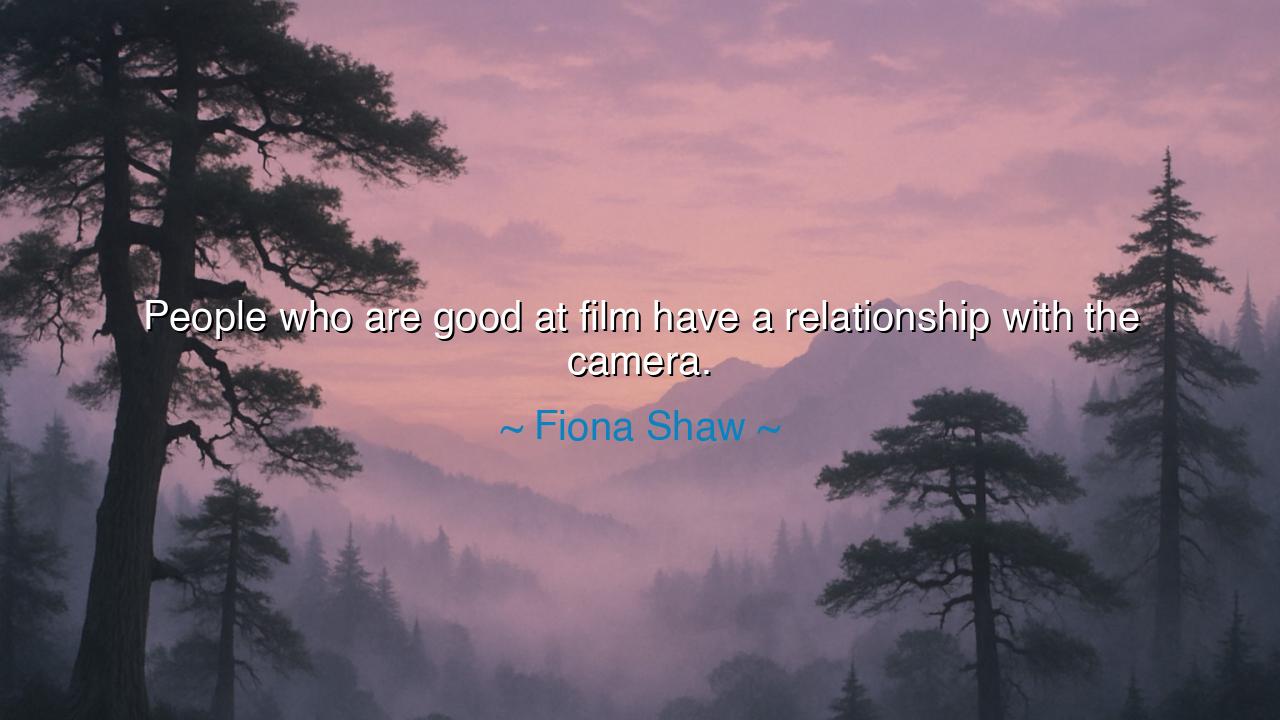
People who are good at film have a relationship with the camera.






Hear, O seekers of art and truth, the words of Fiona Shaw, who declared: “People who are good at film have a relationship with the camera.” In this saying lies a mystery and a revelation: that film is not merely the reciting of lines, nor the playing of gestures, but a communion between the performer and the unseen eye that captures their soul. It is a relationship, subtle and alive, between the human spirit and the silent lens that gazes back without words yet records everything.
The meaning is profound. In the theater, the relationship is between actor and audience, with voice and body carrying meaning across the stage. But in film, the audience is absent, unseen until later; it is the camera that stands in their place. The actor must learn to reveal themselves not to a crowd of faces, but to this unblinking machine. Those who are truly good at film do not fear the camera nor perform over it—they commune with it, they trust it, they let it enter their soul and draw out truth invisible to the ordinary eye.
The origin of these words rests in Shaw’s own craft, for she is both a creature of the stage and of the screen. Trained in the great traditions of live theater, she came to recognize the unique power of cinema: that the camera captures not only what the actor does but who the actor is. Every flicker of the eye, every pause of breath, every unspoken thought is seized and magnified. Thus, to excel in film is not merely to act, but to form a bond with the lens, as though it were a partner in the performance.
History offers mirrors to this truth. Consider Greta Garbo, whose silences in early cinema spoke louder than words. She had no need for extravagant gesture; her power lay in the quiet communion with the camera, which revealed her inner life with a glance. Or think of Charlie Chaplin, whose face, framed by the lens, could move audiences from laughter to tears without a word. These masters did not simply perform—they related to the camera as though it were alive, and in that relationship, their art was immortalized.
The lesson is luminous: whatever your craft, learn to honor the tools that carry your voice to the world. For the actor, it is the camera; for the writer, the pen; for the musician, the instrument. These tools are not lifeless—they are companions. To treat them with indifference is to weaken your art, but to form a relationship with them is to unlock depths that others cannot reach. In this way, the artist becomes not only a master of skill but a vessel of truth.
Practical wisdom follows. If you labor in film, do not fear the camera; trust it, befriend it, let it see you as you are. If you labor in other arts, learn to see your tools not as burdens but as allies. Approach them with respect and intimacy, and they will reward you with fidelity. Let your craft be a dialogue, not a monologue, for in that dialogue lies the spark of authenticity.
So let Fiona Shaw’s words echo across time: “People who are good at film have a relationship with the camera.” Art is never solitary; it is always a relationship—between the artist and the medium, between the performer and the lens, between the soul and the world that will one day bear witness.
Thus, O children of creation, remember: the tools of your craft are not silent—they listen, they record, they reveal. Treat them as companions, form a bond with them, and through them, your art will endure beyond your years, carrying your truth into the eyes and hearts of generations yet to come.






AAdministratorAdministrator
Welcome, honored guests. Please leave a comment, we will respond soon